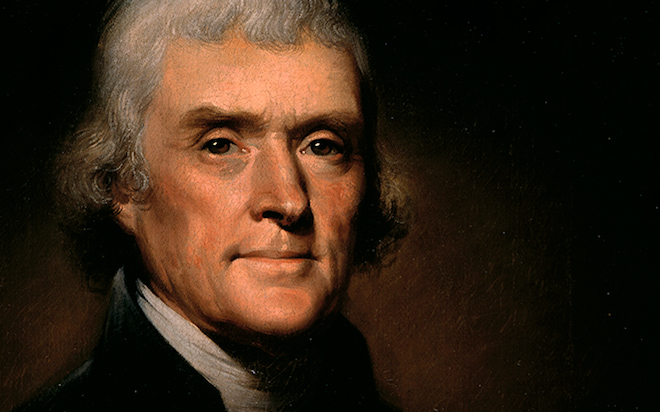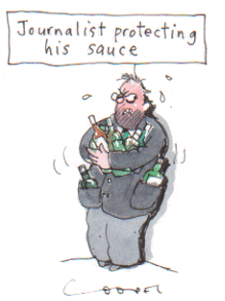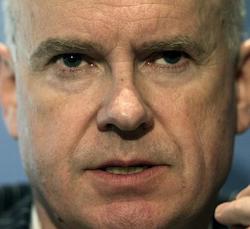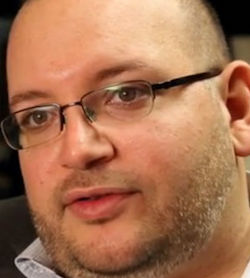Veritas in trouble
 Barely Legal •
Barely Legal •  Tuesday, February 7, 2017
Tuesday, February 7, 2017 The Future of News - Journalism in a Post-Truth Era ... Big chinwag at Harvard with luminaries from the print and online worlds ... Truth now out-of-fashion ... Journos grapple with what's next ... No immediate solutions ... Hannah Ryan's Letter from Cambridge
 Jefferson: Trump on his wavelength
Jefferson: Trump on his wavelength
"Truth itself becomes suspicious by being put into that polluted vehicle," wrote Thomas Jefferson of the newspaper, in 1817.
In this respect alone, Donald Trump might be described as Jeffersonian. Two hundred years since the third POTUS put his derision of the press to paper, the 45th POTUS is proving to be equally as scornful, thrashing about on Twitter with wild cries about 'FAKE NEWS' and the 'failing' New York Times.
The swelling suspicion of facts is bad news for the press, of course, but it's also no good for institutions of higher learning. It's particularly annoying for a university like Harvard, whose one-word slogan is Veritas. How was John Harvard to know that four centuries into the university's lifespan, truth would go out of fashion?
 And so it came to be that hundreds of Harvard ID-holders lined up outside the university's impressive Sanders Theater last Tuesday afternoon (Jan. 31), waiting in sub-zero temperatures and falling snow to get their bums on seats. The occasion was a special event hosted by the University's President Drew Faust, a talkfest - dubbed The Future of News: Journalism in a Post-Truth Era - so popular that students were turned away from the door by the dozen.
And so it came to be that hundreds of Harvard ID-holders lined up outside the university's impressive Sanders Theater last Tuesday afternoon (Jan. 31), waiting in sub-zero temperatures and falling snow to get their bums on seats. The occasion was a special event hosted by the University's President Drew Faust, a talkfest - dubbed The Future of News: Journalism in a Post-Truth Era - so popular that students were turned away from the door by the dozen.
The array of journalistic heavyweights present to share their wisdom proved that while Harvard's motto might be falling into disrepute, its ability to attract a star-studded line-up has not diminished: envoys were sent from the New York Times, HuffPo, the Wall Street Journal, CNN, the Chicago Tribune, and local rag The Boston Globe.
Talking head and editor of The Weekly Standard Bill Kristol kicked off discussions with a trio of D-words.
Disintermediation: the media, he said, had been disrupted by social media and now no longer mediated the way it used to.
Demagoguery: "analytically it's a pretty precise term," to describe the Donald, he argued.
Debility (it can be hard to think of D-words): the media was not as all-powerful as it had always thought it was, he provoked. Recent times had exposed the media's weakness.
It was a bleak sketch of present times, but perhaps Kristol's most memorable remark was his unwelcome reminder to the audience that the devil on Trump's shoulder, Steve Bannon, was a Harvard alum. Embarrassed laughter ensued.
 Baker: people can choose their own factsKristol's speech was just a warm-up for the afternoon's piece de resistance: a panel discussion with WSJ EIC Gerard Baker, newly-crowned HuffPO EIC Lydia Polgreen, and venerable Times columnist David Leonhardt.
Baker: people can choose their own factsKristol's speech was just a warm-up for the afternoon's piece de resistance: a panel discussion with WSJ EIC Gerard Baker, newly-crowned HuffPO EIC Lydia Polgreen, and venerable Times columnist David Leonhardt.
"God knows what is happening while we're sitting here," began the moderator and head honcho of Harvard Nieman Foundation, Ann Marie Lipinski.
"Those of you on your phones, just shout if if something major happens and we'll try to incorporate it."
The three Ds were to come back for the rest of the afternoon. Was disintermediation a bad thing? Not necessarily, suggested Leonhardt, preferring a fourth D-word: democratisation. Maybe it was a good thing that Americans could watch Trump's announcement of the new SCOTUS appointee that night on Facebook Live? And the correction of dodgy facts in articles has certainly sped-up. But one might be forgiven for thinking these are relatively poor consolation prizes.
Diagnoses of journalism's current ills flew thick and fast. "What we're seeing right now is a collapse of empathy in journalism," per Polgreen.
The problem with election coverage "wasn't that we didn't write about the working class," she said. "It was that we didn't write for them." Journalism, Polgreen said, needed to reclaim its roots as a blue-collar profession.
 Polgreen: journalism needs to go back to its blue-collar rootsThe decidedly white-collar Baker from the WSJ saw the press' stormy waters as symptomatic of a broader erosion of trust in key institutions in civil society. Big business had been done no PR favours by the GFC and Enron. The Catholic Church was also not drowning in popularity.
Polgreen: journalism needs to go back to its blue-collar rootsThe decidedly white-collar Baker from the WSJ saw the press' stormy waters as symptomatic of a broader erosion of trust in key institutions in civil society. Big business had been done no PR favours by the GFC and Enron. The Catholic Church was also not drowning in popularity.
"Only the military enjoys the trust it enjoyed fifty years ago," Baker bemoaned. Nowadays, "people can choose their own facts and ignore the facts that are inconvenient to them".
While Leonhardt argued that the media had an unfortunate bias towards negativity, Baker (a Pom by origin) countered that sometimes the American press was not negative enough, showing a "tremendous amount of deference" to the government.
"Why is this lying bastard lying to me?" was his description of a British journalist's thought process when interviewing a pollie. There was not enough of that across the Atlantic, he claimed.
Amidst the chatter and chin-stroking, genuine solutions to the mistrust in journalism were scarce.
Looking forward, Polgreen urged her colleagues to renew their commitment to civic engagement.
"We thought we could outsource the management of our democracy to the professionals and everything would be OK," she said. No longer.
Baker's outlook was measured. "I continue to see the glass as one tenth full rather than nine tenths empty," he said. "So I remain optimistic."
And Leonhardt's motto: subscribe, subscribe, subscribe.
The closing remarks of the afternoon belonged to CNN's media commentary guru Brian Stelter, who spoke of the opportunities in a post-truth society. After all, "this is the moment journalists live for," he said.
"This week, this month, these four years, maybe these eight years." People want information, he argued, and audiences were increasing - his own show, Sunday morning's Reliable Sources, had cracked one million viewers that weekend.
 Rezaian: Post's man in a Tehran prisonBut Stelter also sounded a word of caution, encouraging his colleagues to stop and imagine just how bad things might get.
Rezaian: Post's man in a Tehran prisonBut Stelter also sounded a word of caution, encouraging his colleagues to stop and imagine just how bad things might get.
"This is the time to anticipate and plan for worst case scenarios," he cautioned.
Perhaps Stelter didn't know it, but there was someone in the audience who knew a thing or two about worst-case scenarios for the fourth estate. Looking on from the seats was Harvard Nieman Fellow and Washington Post journo, Jason Rezaian.
Rezaian was heading up the Post's bureau in Tehran when he and his wife were arrested and sent to the clink.
All up, Rezaian spent over 18 months incarcerated on charges of espionage - a very human reminder of what can happen when Jefferson's attitude is taken to extremes.
Hannah Ryan is an Australian law graduate studing at Harvard Law School
Here's the whole show ...
 Fake news,
Fake news,  Journalism
Journalism 









Reader Comments